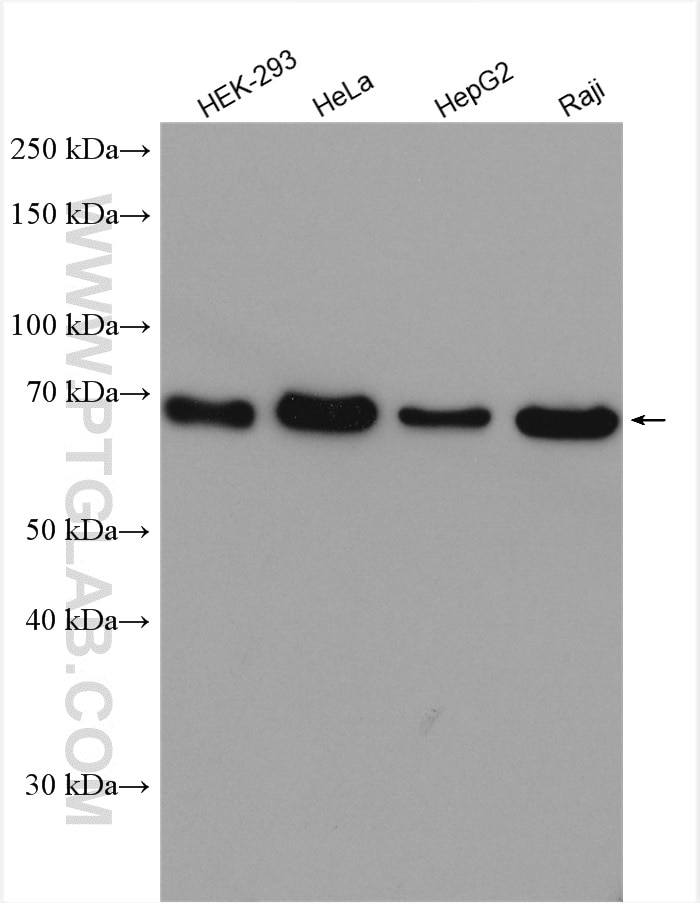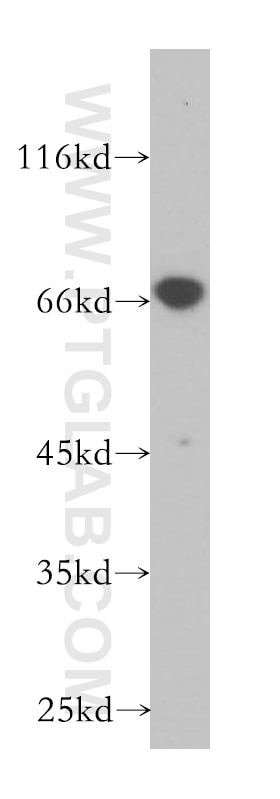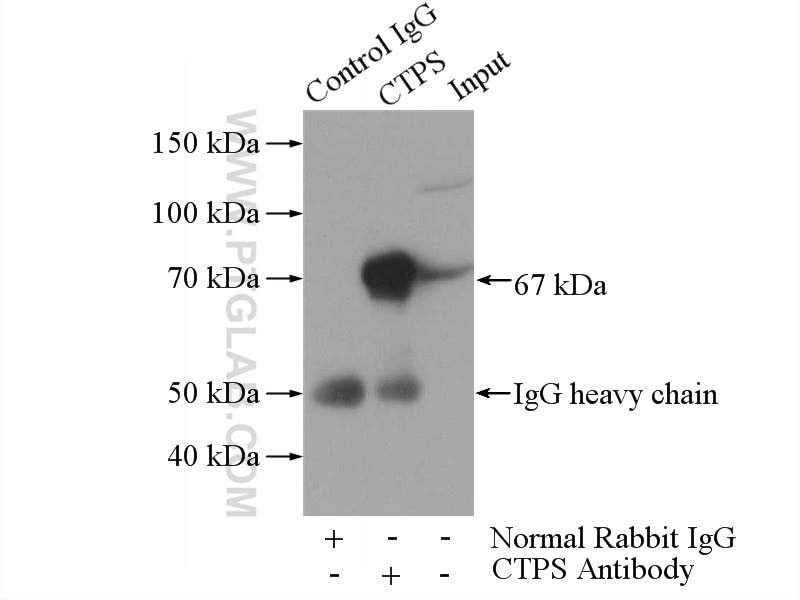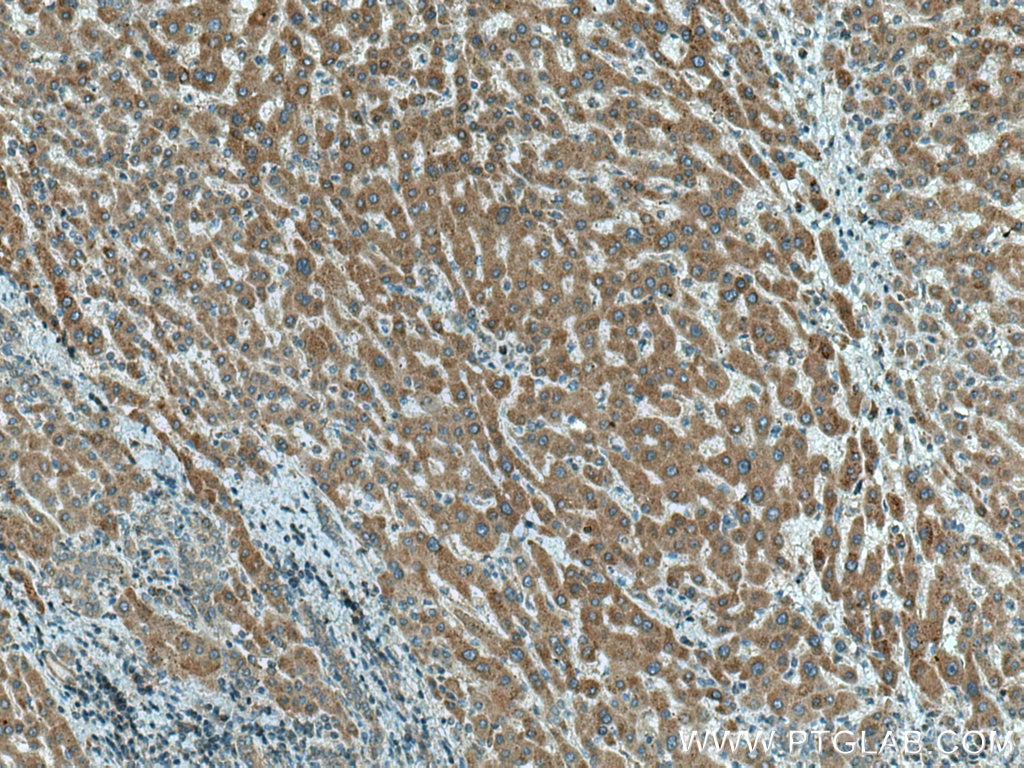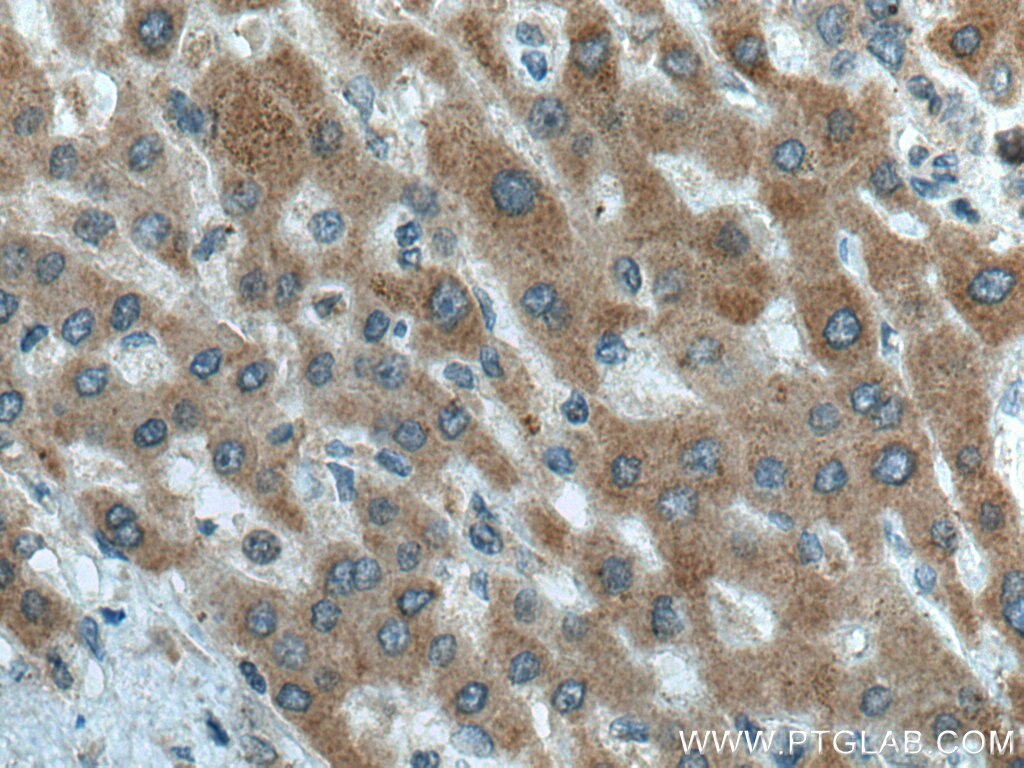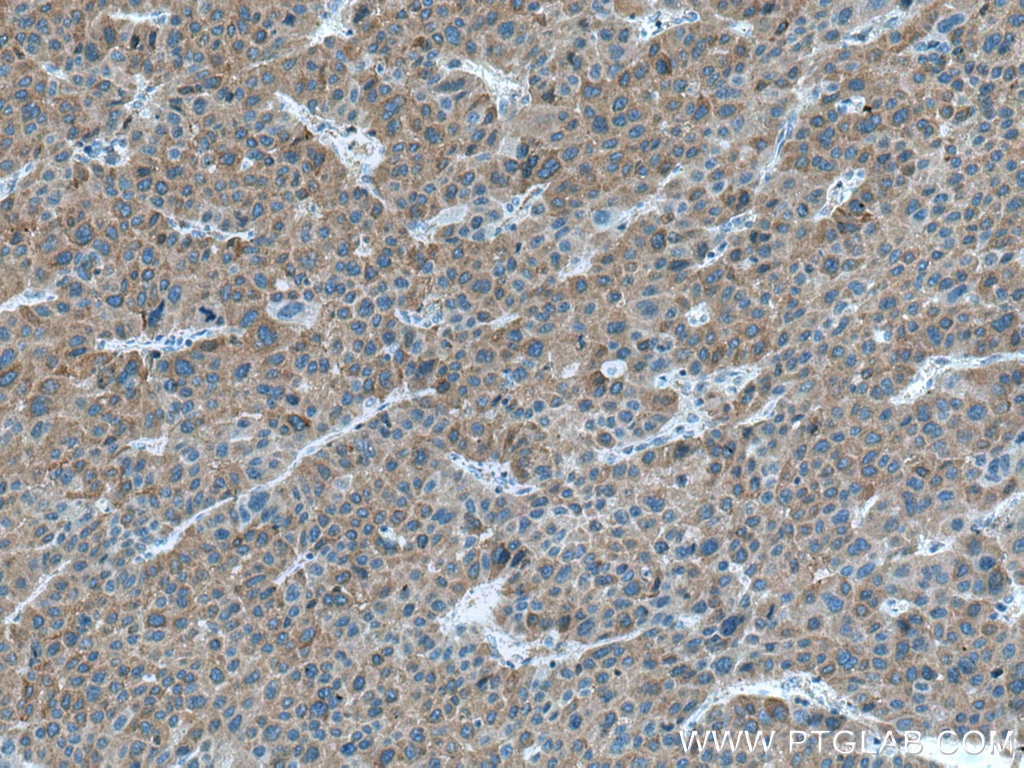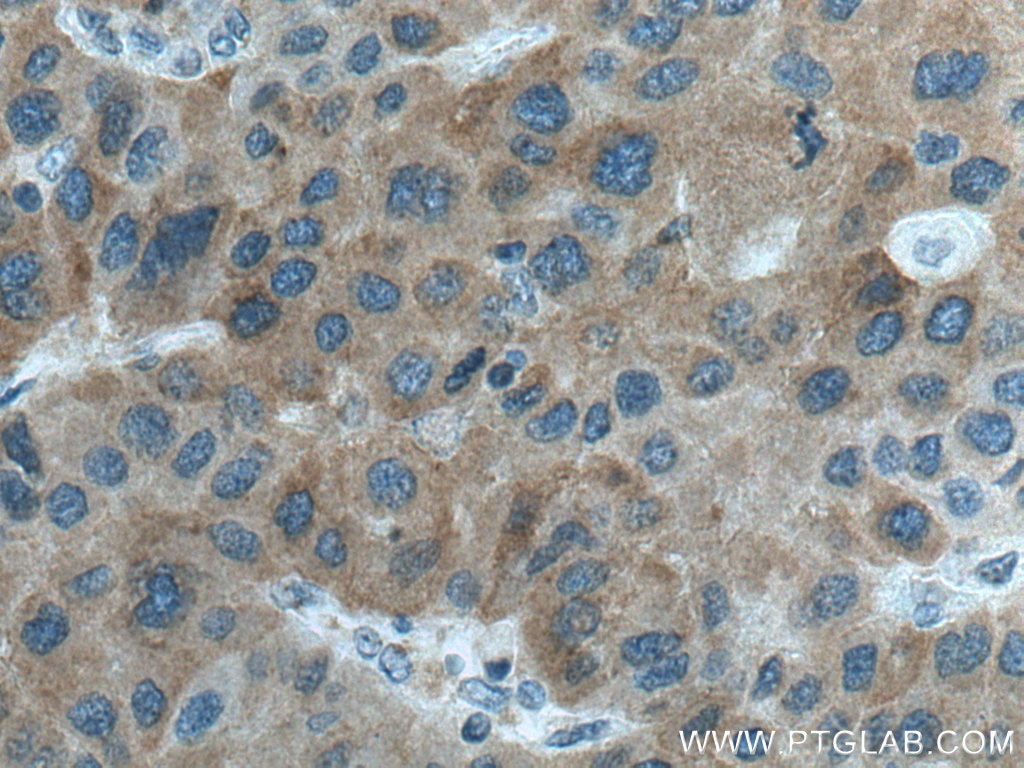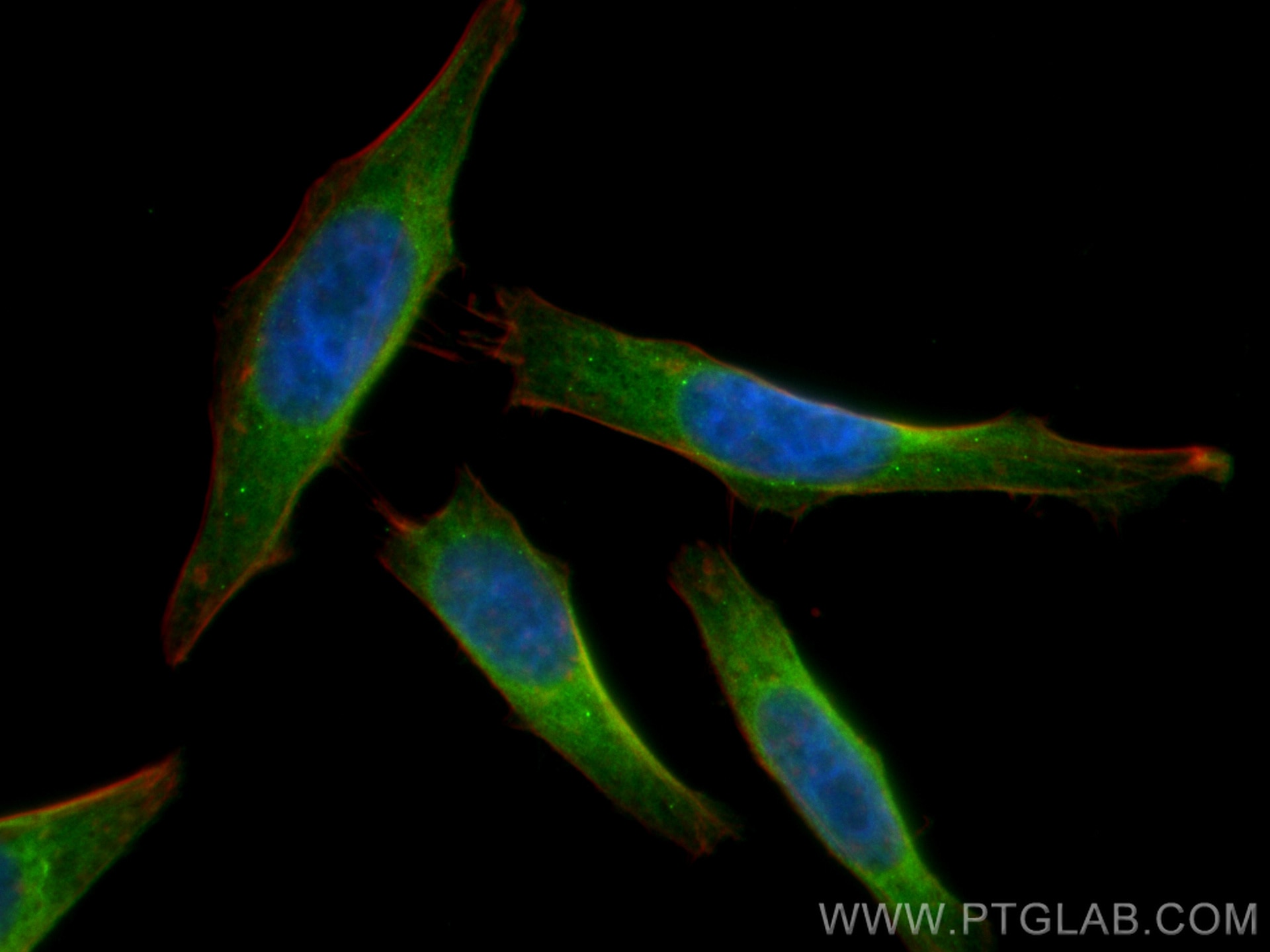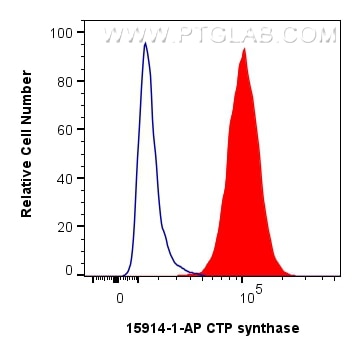- Featured Product
- KD/KO Validated
CTP synthase Polyklonaler Antikörper
CTP synthase Polyklonal Antikörper für WB, IHC, IF/ICC, FC (Intra), IP, ELISA
Wirt / Isotyp
Kaninchen / IgG
Getestete Reaktivität
human und mehr (3)
Anwendung
WB, IHC, IF/ICC, FC (Intra), IP, CoIP, ELISA
Konjugation
Unkonjugiert
Kat-Nr. : 15914-1-AP
Synonyme
Geprüfte Anwendungen
| Erfolgreiche Detektion in WB | HEK-293-Zellen, HeLa-Zellen, HepG2-Zellen, Raji-Zellen |
| Erfolgreiche IP | HeLa-Zellen |
| Erfolgreiche Detektion in IHC | humanes Leberkarzinomgewebe Hinweis: Antigendemaskierung mit TE-Puffer pH 9,0 empfohlen. (*) Wahlweise kann die Antigendemaskierung auch mit Citratpuffer pH 6,0 erfolgen. |
| Erfolgreiche Detektion in IF/ICC | HepG2-Zellen |
| Erfolgreiche Detektion in FC (Intra) | HepG2-Zellen |
Empfohlene Verdünnung
| Anwendung | Verdünnung |
|---|---|
| Western Blot (WB) | WB : 1:1000-1:6000 |
| Immunpräzipitation (IP) | IP : 0.5-4.0 ug for 1.0-3.0 mg of total protein lysate |
| Immunhistochemie (IHC) | IHC : 1:50-1:500 |
| Immunfluoreszenz (IF)/ICC | IF/ICC : 1:50-1:500 |
| Durchflusszytometrie (FC) (INTRA) | FC (INTRA) : 0.40 ug per 10^6 cells in a 100 µl suspension |
| It is recommended that this reagent should be titrated in each testing system to obtain optimal results. | |
| Sample-dependent, check data in validation data gallery | |
Veröffentlichte Anwendungen
| KD/KO | See 3 publications below |
| WB | See 14 publications below |
| IHC | See 2 publications below |
| IF | See 12 publications below |
| IP | See 1 publications below |
| CoIP | See 2 publications below |
Produktinformation
15914-1-AP bindet in WB, IHC, IF/ICC, FC (Intra), IP, CoIP, ELISA CTP synthase und zeigt Reaktivität mit human
| Getestete Reaktivität | human |
| In Publikationen genannte Reaktivität | human, Maus, Stechmücke, Zebrafisch |
| Wirt / Isotyp | Kaninchen / IgG |
| Klonalität | Polyklonal |
| Typ | Antikörper |
| Immunogen | CTP synthase fusion protein Ag8707 |
| Vollständiger Name | CTP synthase |
| Berechnetes Molekulargewicht | 591 aa, 67 kDa |
| Beobachtetes Molekulargewicht | 67 kDa |
| GenBank-Zugangsnummer | BC009408 |
| Gene symbol | CTPS |
| Gene ID (NCBI) | 1503 |
| Konjugation | Unkonjugiert |
| Form | Liquid |
| Reinigungsmethode | Antigen-Affinitätsreinigung |
| Lagerungspuffer | PBS with 0.02% sodium azide and 50% glycerol |
| Lagerungsbedingungen | Bei -20°C lagern. Nach dem Versand ein Jahr lang stabil Aliquotieren ist bei -20oC Lagerung nicht notwendig. 20ul Größen enthalten 0,1% BSA. |
Hintergrundinformationen
CTP synthase(CTPS) is also named as CTPS1 and belongs to the CTP synthase family. It catalyses the ATP-dependent formation of CTP from UTP using either L-glutamine or NH3 as the nitrogen source(PMID:12752439). It is important in the biosynthesis of phospholipids and nucleic acids, and plays a key role in cell growth, development, and tumorigenesis (PMID:8813694). CTP synthetase exists as a dimer in the absence of its substrates ATP and UTP, but in the presence of saturating concentrations of these substrates the enzyme exists as a tetramer.(PMID:18439916)
Protokolle
| PRODUKTSPEZIFISCHE PROTOKOLLE | |
|---|---|
| WB protocol for CTP synthase antibody 15914-1-AP | Protokoll herunterladen |
| IHC protocol for CTP synthase antibody 15914-1-AP | Protokoll herunterladenl |
| IF protocol for CTP synthase antibody 15914-1-AP | Protokoll herunterladen |
| IP protocol for CTP synthase antibody 15914-1-AP | Protokoll herunterladen |
| STANDARD-PROTOKOLLE | |
|---|---|
| Klicken Sie hier, um unsere Standardprotokolle anzuzeigen |
Publikationen
| Species | Application | Title |
|---|---|---|
Cancer Res Combined inactivation of CTPS1 and ATR is synthetically lethal to MYC-overexpressing cancer cells. | ||
J Cell Physiol Energy deficiency caused by CTPS downregulation in decidua may contribute to pre-eclampsia by impairing decidualization. | ||
Front Immunol Flow Cytometry Contributions for the Diagnosis and Immunopathological Characterization of Primary Immunodeficiency Diseases With Immune Dysregulation. | ||
Oncotarget Identification and validation of differentially expressed proteins in epithelial ovarian cancers using quantitative proteomics. | ||
J Cell Sci Rod and Ring formation from IMP dehydrogenase is regulated via the one-carbon metabolic pathway. |
